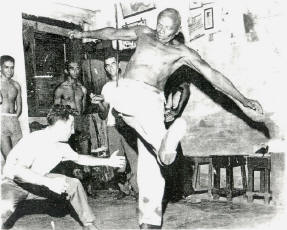YOU SHOULDN’T TEACH ENGLISH IN BRAZIL IF…
1. You want to make a lot of money.
Some ESL teaching jobs – particularly in Korea – offer a very comfortable salary with free accommodation, a contract-completion bonus, paid holidays, health insurance, and even reimbursement for your plane tickets. Jobs like those are fantastic for paying down debts or stashing away a ton of cash for future travel.
You can forget about pretty much any of those perks in Brazil, where teaching salaries place you in the lower-to-mid-range middle class. Teaching 20 hours a week will net you somewhere from R$800 (if you’re with a certain chain school) to R$3600 (if most or all of your students are private classes). Salaries are on the higher side in the south and southeast, though so is the cost of living.
2. You’re impatient and easily stressed.
Brazil will drive you nuts with its long lines, traffic jams, and various daily inconveniences. You have a ton of groceries and there’s no bagger at the supermarket checkout line. You need to get to class across town and discover the bus drivers are on strike. You come home sweaty from a pre-class workout and find there’s no running water in your apartment. You get stuck in the middle of a lake in a paddle boat and the only person who operates the motorized rescue boat is out to lunch for who knows how long (not that that’s ever happened to me…)
You need to have – or develop – what Brazilians call jogo de cintura, the ability to be flexible, to roll with the punches, and to creatively get around obstacles without losing your cool.
3. You don’t like teaching English, but view it as a good way to fund your vacation/partying.
English classes are not cheap for Brazilians, and if they’re investing in quality education, they’ll expect to receive it. If you don’t care about teaching and don’t bother to prepare your classes – figuring your native English conversation skillz will be enough – you will not last long. Also, if you teach adults, your classes will be on evenings, Saturdays, or (if you’re really lucky) at 7 AM before your students start work.
YOU SHOULD TEACH ENGLISH IN BRAZIL IF…
1. You’re adventurous and self-motivated.
The best way to find a job as an English teacher in Brazil is simply to come here and market yourself: visit English schools and offer your services, post flyers for private classes on college campuses, network and spread the word that you’re accepting students. With the exception of one program (IICA) nothing will be arranged for you – so you’ll have to book your own flights, find your own place to live and way around the city, and figure out a way to learn Portuguese. If this sounds more thrilling than terrifying, then Brazil may be the place for you.
2. You’re a “dynamic” teacher.
Most Brazilians, even the high-powered executives and engineers, are fun-lovers at heart. If you’re the type of teacher who puts in the extra effort to make your classes both productive and enjoyable, you’ll be a hit with Brazilian students. That means using your creativity, bringing in new material from outside the textbook/teacher’s book, mixing it up with songs and games, and finding ways to make even grammar practice fun. It takes some unpaid preparation time, but it’s worth it to see the students come alive in your classes!
3. You love Brazil.
In order to live here and maintain your sanity, you have to love Brazil. You have to look past the dirt, violence, corruption, and lack of infrastructure and focus on the beauty of the landscape, the warmth and joy of the people, the sweetness of the fruits, the richness of the culture, the energy of the music, the musicality of the language. You have to learn to live with Brazil’s flaws and concentrate on the excitement of contributing to a developing country that finds itself an increasingly major player on the world stage. You have to believe that “Brazil is the country of the future” without cynically completing the phrase, “…and it always will be.” You have to love this country and root for it as passionately as Brazilians root for their soccer teams.
In short, I don’t recommend teaching English in Brazil if you are new to both.
I do recommend it if:
1) You enjoy English teaching, have a couple years experience in another country and are interested in Brazil; or
2) You’re already living in Brazil for the medium-to-long term thanks to other factors (like marriage to a Brazilian), and you’re looking for work.



